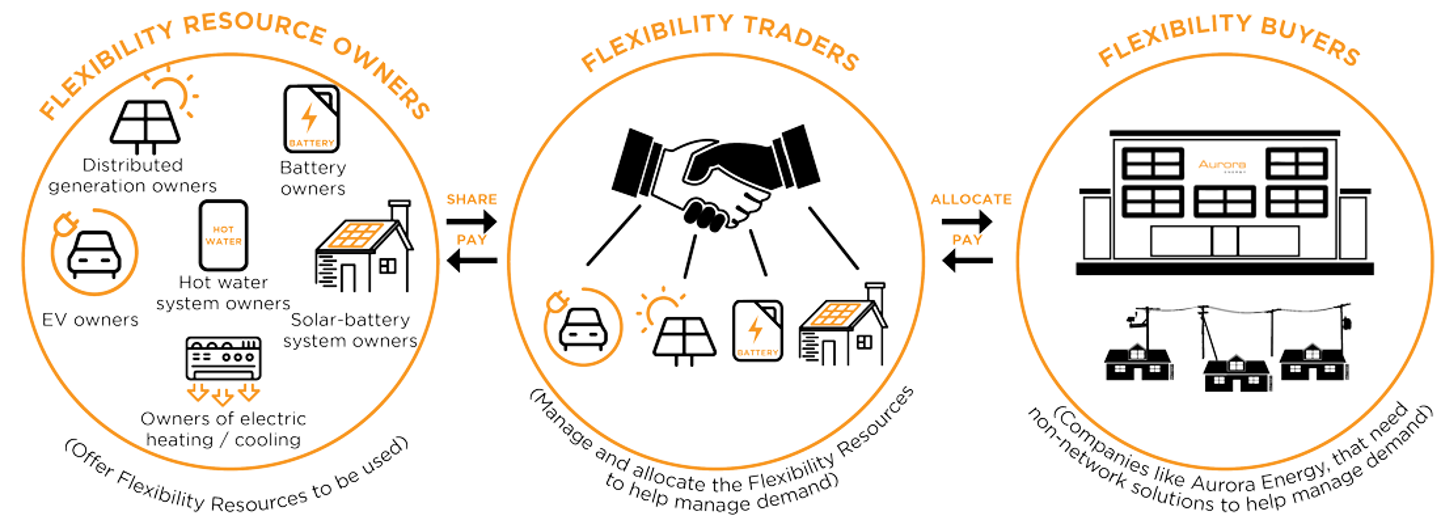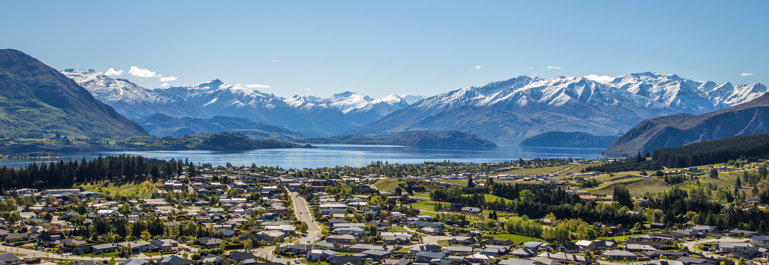Aurora Energy is leading the way for our sector by seeking alternative ways to manage our network and to help drive Aotearoa's efforts towards a decarbonised energy future.
Why is Aurora Energy seeking non-network solutions?
We recognise the shift in how power is used and generated. The way communities are using technology is fast evolving, with an increase in electric vehicles and more and more people generating their own electricity. We need to ensure our network and operating systems can adapt to enable the uptake of new technologies and integrate their operation to provide support to our network, and the wider power system.

Globally, electric vehicles, solar, batteries, hot water and smart control – which are collectively known as Distributed Energy Resources (DER) – are increasingly recognised as being fundamental to an efficient power system that supports the electrification of the economy.
By exploring ways to reduce or defer infrastructure investment, and optimise the use of grid-connected generation, we’ll be able to provide leading-edge and cost-effective solutions for our communities, ensure future growth needs can be met, and ultimately support a net-zero carbon future.
This was the first of its kind for our organisation and has led the way for New Zealand’s electricity distribution industry by going out to an open market for non-network solutions.
Flexibility market explained
The contribution of non-network solutions to help manage electricity demand needs will require the development of new market players and industry roles. Here we have summarised how the future energy system could work with the use of non-network resources, the roles of the market players needed to help, and what they will be responsible for.

Who does what? Roles and functions
| Flexibility resource owners | Flexibility traders | Flexibility buyers |
| Flexibility Resource Owners are those that physically own the Distributed Energy Resources (DER) that can be controlled - solar-battery systems, hot water systems, battery systems, EV chargers, heating/cooling systems (or other systems that can be controlled), or large distributed generation resources and large customers that can reduce load. Owners might be residential and commercial customers, large industrial customers, distributed generation companies and could even be Flexibility Traders. | Flexibility Traders manage a portfolio of DER resources that can be dispatched to respond to network demand needs and allocate them to their highest value use (this is referred to as “value stacking”, rather than dedicating them for single use). Flexibility Traders interact with Flexibility Buyers to provide the flexibility that they require. Flexibility Traders could be new market entrants or existing Retailers growing their capability to manage flexibility resources for the benefit of their customers. | Flexibility Buyers are often companies like us. They may want to use the Flexibility Resources to help manage demand, respond to network constraints, or to defer investment. Flexibility Buyers could also be the Transmission System Operator (to help manage system stability, voltage and frequency), the Grid owner or another Electricity Distribution Business that expresses an explicit need for flexibility and pays for it. Retailers may also offer a discount for customers with flexibility resources. |
Current open calls
There are currently no open calls
Closed open calls
Upper Clutha
Frequently asked questions
We believe the future for our energy system will see many players working together to contribute to, and manage, the electricity needs of our communities. Sharing available resources means we may be able to delay or even avoid building more costly infrastructure, and instead, create new partnerships to help manage the electrification growth of our communities. We see our role as fundamental to helping drive Aotearoa’s decarbonisation goals, and to enabling the use of new technologies to support customer choices and innovation in the energy sector.
Non-network capacity support refers to Flexibility Traders providing flexibility resources to help manage demand. It excludes traditional poles and wires solutions and the provision of distributed energy resources by Aurora Energy.
DER refers to Distributed Energy Resources. That’s those small-scale, distribution-embedded assets that either reduce load or inject more power like EV chargers, solar panels, batteries, or automated load management devices.
Controllable DER is where the output or consumption can be turned up or down based on demand – for example, batteries, hot water and EV chargers can be controlled. Renewable generation like wind or solar is not normally considered controllable without a battery, but in some situations voltage control or generation curtailment can be considered as controllable DER.
A number of resources can be called on to provide capacity support. Existing household systems (like hot water heating) that can be controlled to reduce demand, or Distributed Energy Resources (DERs) such as solar-battery systems, battery systems or electric vehicle chargers. Capacity support could be provided by industrial customers that can reduce demand from certain systems such as irrigation or generating with a network-connected generator. Support could also be provided by large-scale distributed generation. Importantly, network support could be provided through the use of resources not listed here but proposed by those registering their interest.
Non-network capacity support will usually be used to coincide with peak electricity demand and/or a network event in an area. It is often a more cost-effective alternative to building a network solution as it can be flexible to uncertain increases in demand, can delay investment in network infrastructure, or can avoid it altogether.
During our tendering process for the Upper Clutha non-network solution, we found that going to market for alternatives can bring forward viable ideas not previously considered. It demonstrated that there is a role for Flexibility Traders to act as intermediaries between owners of Distributed Energy Resources (Flexibility Resources) and the distribution network owner (Flexibility Buyers, like Aurora Energy). However, given it is a new market, we didn’t want to limit the time for any interested respondents to propose ideas and as a result, create barriers to entry. An open call process allows all those that are interested the time to review requirements, and decide how they want to proceed. It also allows multiple players the chance to contribute to a total solution, with the open call only closing when Aurora Energy has the total capacity required in an area.
Yes, we see the use of non-network solutions as a critical part of our future network strategy. Therefore, where there are parts of our network that would benefit from the use of non-network alternatives, we will run an open call process to seek registrations, and proposals. We will open and close each process as capacity needs are met
The flexible nature of non-network support has led to it also being referred to (internationally and locally) as Flexibility Services.
In short, yes. Provided the total solution meets Aurora Energy’s requirements in terms of capacity support, communications interface, and data capture, it is important all potential parties have the opportunity to get involved, and to help grow this new market offering.
Flexibility Traders can participate in other markets that require non-network solutions, provided Aurora Energy’s requirements can still be met as agreed. This maximises value to those offering non-network solutions and increases the attractiveness of entering the market with demand flexibility.
A Flexibility Management System, or FMS, refers to a system that allows the flexibility buyers (companies like Aurora Energy) to forecast and respond, procure, manage, contract for, issue instructions to, and pay Flexibility Traders.
In general, Aurora Energy’s standard distribution pricing will apply. Our pricing enables Retailers to offer night rates and peak demand prices, and thereby incentivises DER management for network benefits. Flexibility Traders should consider working with a Retailer to provide a ‘whole of ICP’ night-day or peak-off-peak tariff. However, to manage critical peaks on the system, we will provide a signal and associated payment to Flexibility Traders to discharge batteries or run distributed generators.
Still have questions?
If you have a question not answered here, please don't hesitate to get in touch by emailing us at [email protected]
